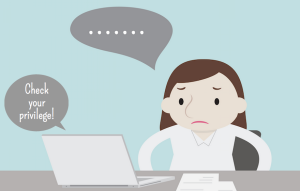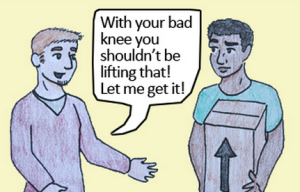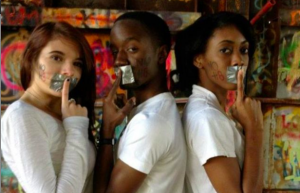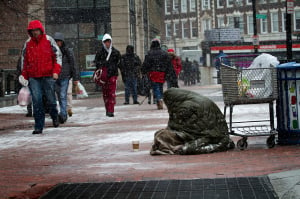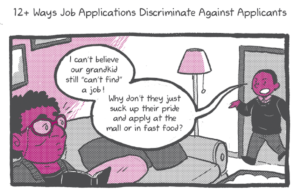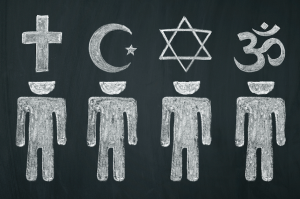
Young person with an asymmetrical haircut and a denim jacket stands in front of two windows with their arms crossed.
When I first came out as transgender, many people wanted to ask me questions about my transition.
At first, I was more than happy to answer because I wanted to help them understand what I was going through.
However, there is a difference between asking a question out of pure curiosity, and asking something that is full of judgment.
And although I was initially glad to answer questions, the constant inquiries get exhausting after awhile.
The most common defensive response I receive after asserting my boundaries is, “Geez, you can’t even ask questions anymore without these social justice warriors getting offended!”
What they don’t realize is the pure volume of questions and hate mail that I (and many other trans people in the world) receive on a daily basis.
Although I sympathize with people who are genuinely curious, my patience can only go so far, and there comes a point when their questions are either bordering on transphobia or are downright transphobic.
Many of them believe that since they aren’t physically harming me, their questions are completely innocent.
But there are more ways to abuse someone than physical violence. They think that their opinions are harmless, and this couldn’t be further from the truth.
The insistence on repeatedly asking invasive questions is exhausting, damaging, and condescending to trans people.
Every question is basically saying, “Prove to me that you are who you say you are.”
This attitude makes the world a lot less livable for trans people because it’s a reminder that we don’t “fit in” to the culture according to society’s standards, and groups of people should never be treated in such an intolerant way.
Here are some reasons why anti-trans skepticism is not just a harmless opinion.
1. It’s Dehumanizing
A common occurrence on social media is the discussion of marginalized groups like they’re hypothetical ideas. When I see hundreds of people discussing trans issues like I’m not a real actual human being, it’s very disheartening, and it happens every day.
For example, I’ll see people commenting about the anti-LGBT bill in North Carolina discussing trans women like we’re perverts and pedophiles. It’s never from a place of knowing an actual trans person or having negative experiences with any trans people; it’s based on a fear of the unknown.
When they discuss me like I’m a hypothetical idea, I can’t help but want to scream that I actually exist. I’m real, and I have a right to exist.
When people become dehumanized in this manner, it opens doors for others to inflict violence and hatred towards them because they’re not seen as deserving of sympathy or empathy. Since they’re not viewed as actual human beings, they’re also perceived as undeserving of basic human rights.
The trans community is the latest group to be pushed further into the outskirts of society because we scare people just for being different. They want to push us so far away that they can’t see us anymore.
They would rather us be invisible, so they kill us at a tragic and alarming rate. This type of treatment not only creates an unlivable environment for transgender people; it also contributes to the astonishingly high suicide rate in the trans community.
Nobody should have to feel this way in society, and nobody should have to endure the very real violent climate that results from constant and consistent dehumanization.
2. It Forces Trans People to Continually Validate Their Own Existences
I answer questions about my transition on a daily basis, and I generally don’t mind; when seemingly innocuous questions add up, however, I lose my patience and become emotionally exhausted having to constantly validate my own existence.
What many people don’t realize is just how frequently I have to answer invasive questions, and I regularly chastise myself for not being more patient.
“Do you still have a penis?”
“Are you getting surgery?”
“Are you on hormones?”
“Do you want boobs?”
“Wait, you have a girlfriend? So… are you a lesbian?”
“How do you two have sex?”
“How do you know for sure that you’re a woman?”
“Why can’t you just be an effeminate man?”
These questions become so overwhelming. I get exhausted, and I wish people would just let me live my life peacefully.
It’s as if I’m being asked to pass a litmus test, and unless I pass the test to someone else’s satisfaction, they won’t accept my identity. They may not realize they’re doing this consciously, but it’s the way I feel after being treated like I’m a science experiment.
To illuminate this point further, most people who identify as heterosexuals don’t have to answer a million questions about their sexuality, and even if someone does imply that they aren’t hetero, some of them they will fly off-the-handle — partially due to homophobia — but also due to the frustration that somebody isn’t taking them at their word.
All that should matter to other people is that I’m much happier now, and my gender identity is not infringing on anybody else’s life. It shouldn’t be that difficult to grasp.
This may not seem transphobic since it doesn’t seem blatant. After all, it’s just curious people asking questions, right?
But it is bigoted in the sense that there is a lack of acceptance that being transgender is a valid identity. With the sheer volume of questions getting asked, the underlying implication is, “Are you sure you’re not just making this up?”
I know that there are those out there who, when they ask these questions, do so because they care about me as a person, but I also know that if they were hooked up to a lie detector test and asked if they thought I was really a woman, they would fail the test.
All of these questions they ask could be answered with a quick Google search, that is, if people actually cared to learn that this is a real and valid identity and has been for thousands of years.
It would be nice if when somebody came out as trans, people would just believe them instead of acting skeptical. After all, nobody likes to be called a liar about who they are.
3. It Disguises Pseudoscience as Actual Facts
Every day, I read a comment from someone who views themselves as a “rational” human being. This person knows all the facts and can’t wait to share it with the world.
They bestow real gems such as, “If you have a penis, you’re a boy, and if you have a vagina, you’re a girl. It’s biology.”
They say it like they’re going to drop a microphone afterwards to a standing ovation. Unfortunately, many people still believe this concept, so even people who want to be accepting become bogged down by these pseudoscience presumptions.
I hesitate to even bring up science because I feel like it’s further evidence that I have to constantly validate my existence, but I also believe that it’s necessary to clear up a few simple misconceptions.
First, the “it’s biology” argument in the aforementioned paragraph is referring to biological sex, not gender. Not only that, but their presumptions about biological sex are wrong, because there are more than two sexes.
Gender, however, is an innate feeling, and gender is on a spectrum. We’ve only scratched the surface with how many genders there actually are.
As of now, there are over 50 known genders — this is already using more science than the detractors were using.
Second, the obsession with using science in order to prove that something is “real” is extremely insulting. It’s reminiscent to how gay people’s identity were put into question so there was an elusive search for a “gay gene.” Also, using pseudoscience as a means of oppressing people has been around for centuries as we’ve seen with the racist history of eugenics.
The people who bring up “biology” in these cases, I’m guessing, do not care about science. They want what they view as “hard evidence” to prove that an entire group of people are inherently inferior or defective.
Even though I don’t feel like their fears deserve to even be validated, it’s important to realize that even if we were to look at their “biology” argument, the facts are not on their side no matter how much they protest.
They are simply not used to seeing a new paradigm so they feel like it’s not real even though the evidence is overwhelmingly against them.
4. Children and Teens (Including Those Who Are Trans) Are Listening
When a politician like Ted Cruz spews hate speech at the LGBT community, or when an online troll spews as much disgusting rhetoric as possible, it’s almost as if they don’t realize how many young people hear and read what they’re saying. There’s no telling what sort of damage this causes.
There are many children and teenagers who are trans but are afraid to come out due to this hateful rhetoric. Being told that their existences are invalid, even peripherally, has resulted in an even higher suicide rate among transgender youth.
And for children and teens who are not transgender, some of them will learn that it is okay to discriminate others just because they’re different. Prejudice and hatred have to be taught. When children are taught to treat others with respect, there’s less likelihood that they’ll be bigoted, because they haven’t internalized as much misinformation as adults.
When I visited some extended family last year, I was mostly worried about my 11-year-old relative who had always known me by my former male identity. I thought it would be harder for her to grasp.
However, to my pleasant surprise, she understood the concept more than anybody else. In some ways, she understood it more than I did, because she didn’t internalized as much misinformation as the adults (including myself, since I’m also the victim of learning a ton of misinformation that I’m trying to unlearn).
When they told her about me, all she said was, “So Robert’s actually a girl and is named Robin now? So, we should start calling her ‘she,’ right?” For her, it was as simple as that, and she never misgendered me once.
If we teach children to be accepting at an earlier age, the next generation will make it substantially easier for people of all ages to come out and be themselves.
But if as a society we keep spewing this vitriol against those who we deem as “different,” we continue the vicious cycle of hatred and violence. I think we’re closer to breaking the cycle than we’ve ever been, but there is still a lot of work to do.
***
The concerted effort to marginalize other people creates a toxic society. Transgender people don’t want special treatment. We just don’t want to be marginalized, oppressed, and mistreated. We want to be treated equally, and transphobia keeps that from happening.
And it isn’t only toxic for the marginalized. It’s even damaging for the oppressors themselves. Holding these bigoted beliefs towards other human beings means having to hold a certain amount of hate in their hearts to sustain such hateful convictions.
Not only is it the right thing to do, it is mutually beneficial for everybody to accept each other for who they are.
[do_widget id=’text-101′]
Robin Tran is a Contributing Writer for Everyday Feminism. She is a standup comedian and blogger, and she holds a BA in English from UC Irvine. In early 2015, Robin came out as transgender woman and has written about her firsthand experiences ever since. She has performed at the Improv, Mad House Comedy Club, and the Comedy Palace, and her articles have been published in xoJane and Time.com.
Search our 3000+ articles!
Read our articles about:
Our online racial justice training
Used by hundreds of universities, non-profits, and businesses.
Click to learn more






